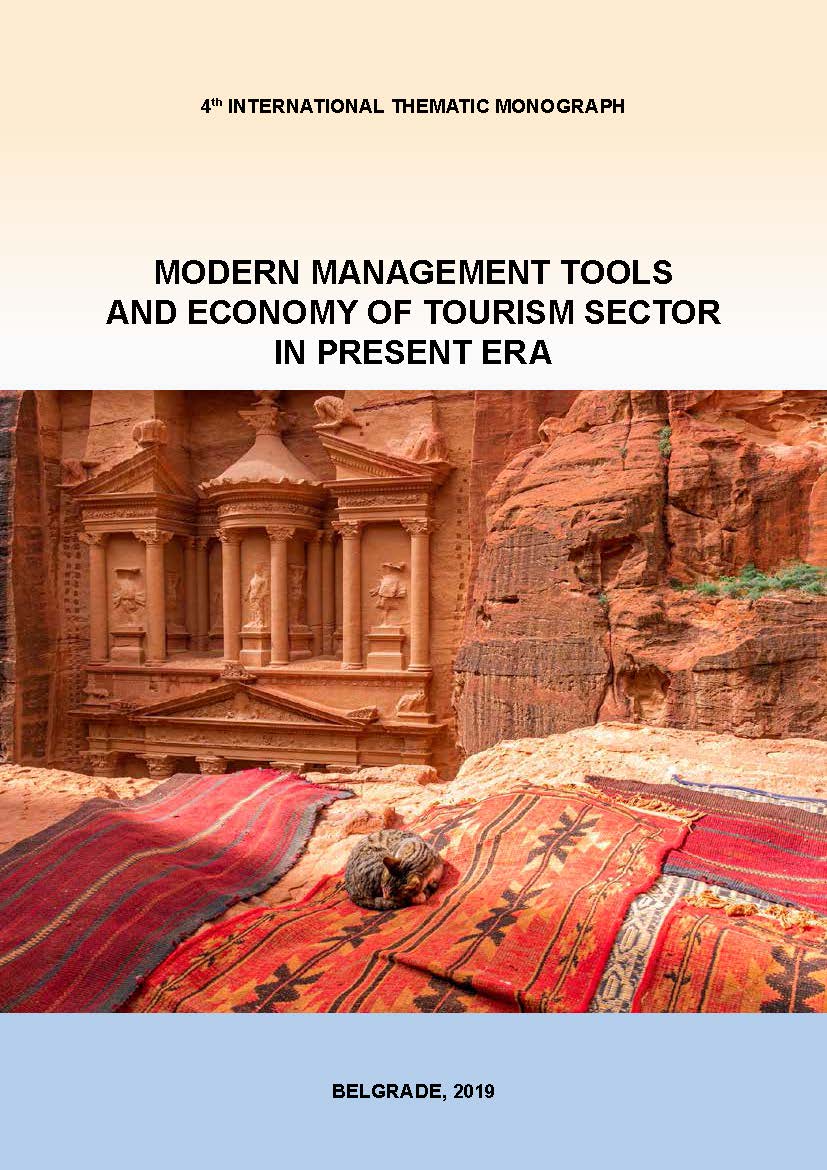|
THE ROLE OF UNESCO HERITAGE IN THE BOUTIQUE TOURISM OFFER IN SLOVENIA Jasna Potočnik Topler University of Maribor, Faculty of Tourism, Cesta prvih borcev 36, 8250 Brežice, Slovenia Lea Kužnik University of Maribor, Faculty of Tourism, Cesta prvih borcev 36, 8250 Brežice, Slovenia DOI: https://doi.org/10.31410/tmt.2019.629 4th International Thematic Monograph - Modern Management Tools and Economy of Tourism Sector in Present Era, Belgrade, 2019, Published by: Association of Economists and Managers of the Balkans in cooperation with the Faculty of Tourism and Hospitality, Ohrid, North Macedonia; ISSN 2683-5673, ISBN 978-86-80194-29-5; Editors: Vuk Bevanda, associate professor, Faculty of Social Sciences, Belgrade, Serbia; Snežana Štetić, full time professor, The College of Tourism, Belgrade, Serbia, Printed by: SKRIPTA International, Belgrade
|
|
Abstract: Cultural heritage is a significant co-creator of the tourist offer, especially if it carries the prestigious title of a UNESCO World Heritage Site. UNESCO’s heritage strengthens national identity and is universally recognisable. The particularity of Slovenia is the fact that only the Škocjan Caves are among the main tourist attractions of the destination as an example of a UNESCO (natural) Heritage Site. All other UNESCO Heritage Sites in Slovenia are less known, but they represent the foundation for the development of boutique and exclusive tourist offers and boutique tourism in contrast to mass tourism, which is challenging at many destinations which brand themselves as UNESCO Heritage Sites since they are very often facing overtourism. Slovenia is ranked on the UNESCO World Heritage List with the following Heritage Sites: The mercury heritage (mercury mine in Idrija), prehistoric catches at the Ljubljana Marshes, and natural heritage - the Škocjan Caves, the ancient and primaeval beech forests in the Krokar jungle, and the Snežnik Ždrolce reserve. On the UNESCO representative list of the intangible cultural heritage of humankind, there are tours of the Kurent traditional masks, the drywall construction, lace knitting and Processio Locopolitana (the Škofja Loka Passion Play). The inclusion of heritage into a modern tourist offer requires reflection and a professional approach. What is good for protecting and preserving the heritage is not necessarily good for tourism, and what is good for tourism is rarely appropriate for heritage protection. Therefore, the integration of heritage in the tourism offer, the creation of heritage-based models, is a matter of strategic design and professional decisions. In the chapter it will be analysed how, or in what way, the UNESCO heritage in Slovenia is included in the modern tourist offer. This will be determined by employing field work, the technique of partially structured interviews with stakeholders who protect and explore the selected heritage, and tourist providers who interpret heritage in various ways and incorporate it into modern (boutique and exclusive) tourist offers. We will also obtain information through the analysis of websites and field visits to the UNESCO Heritage Sites. In doing so, we will highlight examples of good practices for each UNESCO heritage case. On this basis, it will be determined what are the possibilities and opportunities for integrating the UNESCO heritage into the modern boutique tourist offer of Slovenia. Keywords: heritage, heritage tourism, UNESCO, tourism offer, Slovenia. REFERENCES Fog, K., Budtz, C., Munch, P., Blanchette, S., 2010. Storytelling, Branding in Practice. Belin Heidelberg: Springer – Verlag. Gačnik, A., Bogataj, J. 2004. Dediščina kurenta v kulturi Evrope: etnološko muzeološki vidik. Ptuj: Znanstvenoraziskovalnosredišče Bistra. Handbook for the interpretation of cultural heritage (Priročnik za interpretacijo kulturne dediščine b.d.). Ljubljana: Ministrstvo za šolstvo in šport. Kužnik, L., Veble, N. 2018. Into the dark – Dark Stories in the Cities of Brežice and Krško in Slovenia as a Basis for the future Dark Tourism Products, International Journal of Tourism Cities, Vol. 4, No. 1, 40-53. Lenzerini, F. 2011. Intangible Cultural Heritage: The Living Culture of Peoples, European Journal of International Law, Vol. 22, No. 1, February 2011, 101–120. Retrieved from: https:// doi.org/10.1093/ejil/chr006, 5. 4. 2019. Mihalič, T. 1999. Poslovanje in ekonomika turističnih podjetij. Ljubljana: Ekonomska fakulteta. Mihevc, A., Gabrovšek, F., Knez, M., Kozel, P., Mulec, J., Otoničar, B., Petrič, M., Pipan, T. Prelovšek, M., Slabe, T., Šebela, S., Zupan – Hajna, S. 2016. Karst in Slovenia. Boletin Geologico y Minero. Vol. 127, No. 1, 79-97. Potočnik Topler, Jasna, Zubanov, Violeta, Gorenak, Mitja, Knežević, Mladen. 2017. Communication skills in the tourism sector: the role of tour guides in presenting attractions. Tourismos, Vol. 12, No. 1, str. 59-78. Strategija, 2017. Strategija trajnostne rasti slovenskega turizma 2017 – 2021. Strategy of the sustainable growth of Slovenian tourism 2017-2021. Retrieved from: http://www.mgrt.gov.si/ fileadmin/mgrt.gov.si/pageuploads/Strategija_turizem_koncno_5.10. 2017.pdf, 4. 5. 2010. Swarbrooke, J. 2003. Adventure tourism. Oxford: Linacre house. Vecco, M. 2010. A definition of cultural heritage: From the tangible to the intangible. Journal of Cultural Heritage. Vol. 11, No. 3., 321-324. Zelnik, D., Štembal, M. 2008. Ohranitev kraške krajine kot razvojna priložnost Krasa. Zbornik referatov in razprav. Ljubljana: Državni svet Republike Slovenije. https://www.thetravelword.com/, Accessed on 3.5.2018 https://www.park-skocjanske-jame.si/informacije/certifikati#a_UNESCO, Accessed on 1.5.2019 http://www.visit-idrija.si, Accessed on 12.4.2019 http://www.mk.gov.si, Accessed on 2.5.2019 https://whc.UNESCO.org/en/list/1363, Accessed on 23.4.2019 http://www.mizs.gov.si, Accessed on 20.4.2019 http://www.slovenia.info, Accessed on 20.4.2019 https://ich.UNESCO.org, Accessed on 2.5.2019 http://www.ljubljanskobarje.si, Accessed on 11.4.2019 http://www.pasijon.si, Accessed on 3.4.2019
| |||||||
Association of Economists and Managers of the Balkans
- UdEkoM Balkan -
179 Ustanicka St, 11000 Belgrade, Republic of Serbia
E-mail: [email protected]
www.udekom.org.rs
- UdEkoM Balkan -
179 Ustanicka St, 11000 Belgrade, Republic of Serbia
E-mail: [email protected]
www.udekom.org.rs
Tel. +381 62 812 5779
VAT number: 108747027
Registration number.: 28157347
Registration number.: 28157347


